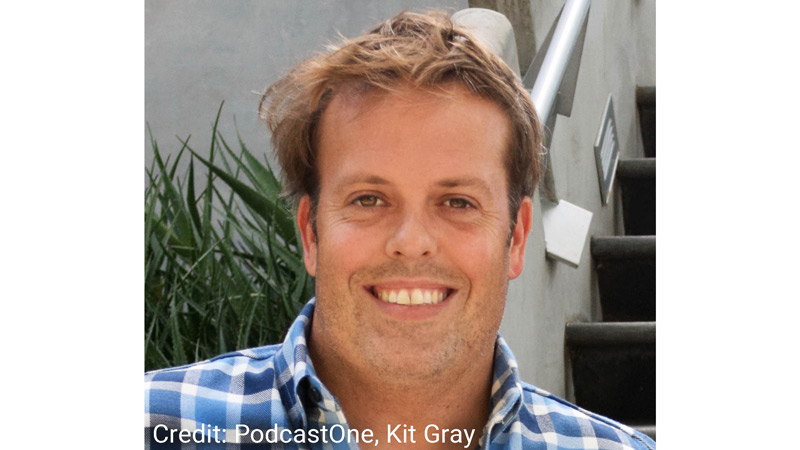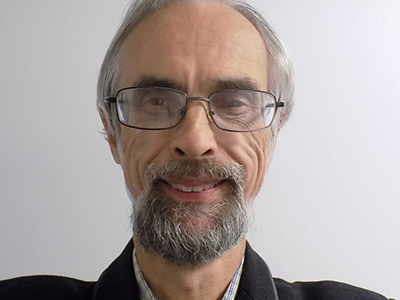Kit Gray's PodcastOne Empire Is Riding the Tidal Wave of Streaming Infotainment
You may be addicted to a podcast for which there is no 12-step program, so you just keep listening in the privacy of your car whenever you can sneak it in. It probably includes a reality show champion, former sports hero, genius money manager, outspoken politico, an expert on some obsession, or an investigator of cold case murders. At least that might be the conclusion in looking at the hundreds of programs on the platform of the PodcastOne empire. Podcasts are booming again after the pandemic disrupted the industry's skyrocketing growth.
"When it first hit, it was scary, even though people had lots more time at home to listen, because our advertisers could not get products from overseas to fulfill customer demand," PodcastOne's founder and president Kit Gray told Startup Savant. "Rather than having them leave us, we negotiated agreements to push back their ads until later in the year and worked out arrangements to delay payments to our podcast hosts so we could keep afloat. Everyone on our team and in our network pulled together to get through the crisis. When movies and TV series stopped filming, podcasts became the main source of fresh entertainment and educational content. In October, we came roaring back and our space is on fire. In 2021, we anticipate growing our numbers by adding new shows and talent to our extensive roster along with offering new opportunities to monetize a robust engaged community."
As Startup Savant writer Robert McGarvey documented in November, the podcast industry has had overall tremendous growth in recent years, and there is no end in sight. At the end of 2020, there were 1.5 million podcasts, double the number the year before, with more than 34 million episodes. It's a fresh way for companies, experts, and others with a passionate following to get their message out.
Alas, most of them don't make money and fail quickly. PodcastOne makes it much more likely that those they host will succeed since it generates more than 2.2 billion downloads per year with 400+ episodes per week across a stable of hundreds of top podcasts.
"Our business model is driven by content and production," Gray enthused. "This team of talented individuals do much of the heavy lifting. They research the content of the episode, the guests, the goals of the talent, marketing the episode and delivering great ad reads!” Gray enthused. "A typical host has many projects they are juggling, but if they are committed to working within the system that PodcastOne provides and promote the show, they have a great chance at success. We are a little different at PodcastOne as we incorporate more than just what the host reads about sponsors within our episodes, intertwining an explanation of the benefits with the program content. We are including sponsorable segments, social media activations, contesting opportunities and show-branded merchandise. Most recently, we've added video and live show capabilities to our offerings through our parent company, LiveXLive. Our vodcasts — video podcasts — live on YouTube and LiveXLive.”
Gray believes that celebrity guests are a great way to bring initial attention to a show and build excitement; however, a great host is key to a podcast’s longevity and success. The host carries the show and is, at the end of the day, what an engaged audience and community is built upon. The next-gen stars will probably come from young hosts on media like YouTube or TikTok, he says.

Entrepreneurial Roots
Gray grew up in Marblehead, Massachusetts, "a lovely town north of Boston where my parents and my brother and his family still live," he said. His mother was a teacher, and his father owns a construction company in the region. "They taught me the values of hard work, sacrifice, and education and helped put me through a great college."
He earned a B.S. in environmental studies at Rollins College in Winter Park, Florida, graduating in 1999. He paid expenses by teaching tennis and bartending ("my favorite job"). After adding an MBA from its business school, he accepted a job offer from an aerospace company to work in its finance department. "I love numbers, but this just wasn't for me, and I left after a year," he said.
Moving to Chicago, he worked as a bartender, where one of his customers, a manager with the broadcasting giant Clear Channel Communications, recruited him to sell ads for radio on a national level.
"I moved to New York City for training, learned everything about how companies decide where their messages are placed, planning departments, ad agencies, and media buyers, then moved back to Boston to work in the office there," Gray recalled. "While I was there, one of my mentors in the business invited me to come to Los Angeles and sell for Clear Channel in 2004 (rebranded as iHeart in 2014). I had always wanted to live there and was one of their top ad reps. But I found the local program content unexciting and in 2006, when Howard Stern announced he was moving from his Viacom radio show to Sirius Satellite Radio, I realized I needed to get out of radio."
Gray left to work at a startup company where his education and passion for the digital world began. He was then asked to return to Clear Channel to run a digital division of the representation firm Katz Media Group. The opportunities were not yet available for his vision of an independent digital platform, so he decided to leave and sell solar panels, but that industry was also not ready for prime time. "It was the hardest work I ever did, but my struggles have always taught me important lessons on what I really wanted to do," he said.
As he was driving around selling solar, he listened to his first episode of "The Adam Carolla Show," a podcast recommended by a friend. Carolla had been hosting a popular morning drive radio program but was let go in February 2009 as part of a format change, so he started the podcast. He was best known for co-hosting "Loveline" with Dr. Drew Pinsky, a sex advice radio program from 1995 to 2005.
"At that time, listening to a podcast wasn’t easy," Gray said. "You had to download the file, dragging it onto an iPod, then connect it to a player to plug into a device in the car, and it was only available on iTunes. As I listened to Adam, I knew this was the sort of thing I wanted to be doing. It was my 'ah-ha!' moment. I knew this was the evolution of audio, and I wanted to make it happen. I knew there was money to be made.”
Launching PodcastOne
Gray contacted Carolla to discuss ad sales and audience growth. This was the catalyst for Gray to start his own company, Launchpad, with Carolla as his partner and first client. Their vision was to produce and market podcasts. Norm Pattiz, who founded the radio network Westwood One, soon came on board. Eventually, Launchpad grew to be PodcastOne.
“Although I attended business school, I feel like the first few years spent with Norm really advanced my career," he said. "He is such a champion of the audio space and really helped me push myself to new heights.”
Many shows invite listeners to call in with questions, but the majority of most audiences tune in later at their own convenience, much like on-demand TV. Vodcasts are the latest trend and hosts can promote them on their own websites and social media.
There is a staggering variety among the 200 to 250 programs on PodcastOne at any given time, with a small number that don't get long-term traction. Among the most popular are “WTOP’s American Nightmare,” "Off the Vine with Kaitlyn Bristowe," “The Adam Carolla Show,” "The Jordan Harbinger Show,” and “The LadyGang." Other celebrity hosts include Michael Cohen (former President Trump's lawyer), TikTok and YouTube sensation Jordyn Jones, and NFL greats Michael Irvin and Brett Favre. In addition, there are plenty of niche shows like "Our Fake History," "Autopsy: The Last Hours," and “Court Junkie.”
One of Gray's favorites is The Jordan Harbinger Show, which has guests like Mark Cuban and author Malcolm Gladwell discussing self-improvement and best business practices and was recognized as one of the best podcasts by Apple in 2018. Irvin's show hasn't yet received the visibility it deserves, Gray says, so he's hoping to boost it this year as the NFL continues to explode.
In July 2020, at a time when PodcastOne was struggling, it decided to accept an offer to be acquired by LiveXLive Media Inc. (NASDAQ: LIVX), a Beverly Hills-based digital media and live music streaming host. It provided not only better capability for streaming live events, but funding to recruit more top personalities and advertisers. "We can now offer bigger packages to sponsors and the opportunities to have a tie-in with stars," Gray explained. "A great example of this was the vodcast that Pitbull recorded from his Slam School in Miami, launching a concert series spearheaded by the LXL team. This collaboration resulted in sponsorship sales to KFC, State Farm, and Pepsi and is a practice we hope to continue as we grow together as one company.”
Gray and his team are always looking for new programs, some of which they find by watching trends on iTunes and social media platforms, while others come from talent agents. Anyone can email a pitch to the company that lays out why their idea they think could spark a successful podcast, covering subjects that a lot of people would be intensely eager to listen to and talk about for a long time and others aren't addressing.
If you have that magic formula, get prepared to surf the tidal wave.
About the Author

Scott S. Smith has had over 2,000 articles and interviews published in nearly 200 media, including Los Angeles Magazine, American Airlines’ American Way, and Investor’s Business Daily. His interview subjects have included Bill Gates, Richard Branson, Meg Whitman, Reed Hastings, Howard Schultz, Larry Ellison, Kathy Ireland, and Quincy Jones.
Startup Resources
- Learn more about Startups
- Visit the TRUiC Business Name Generator
- Check out the TRUiC Logo Maker
- Read our Business Formation Services Review
- Find Startup Ideas
- Explore Business Resources
Form Your Startup
Ready to formally establish your startup? Click below to read our review of the best business formation services!
Best Business Formation Services